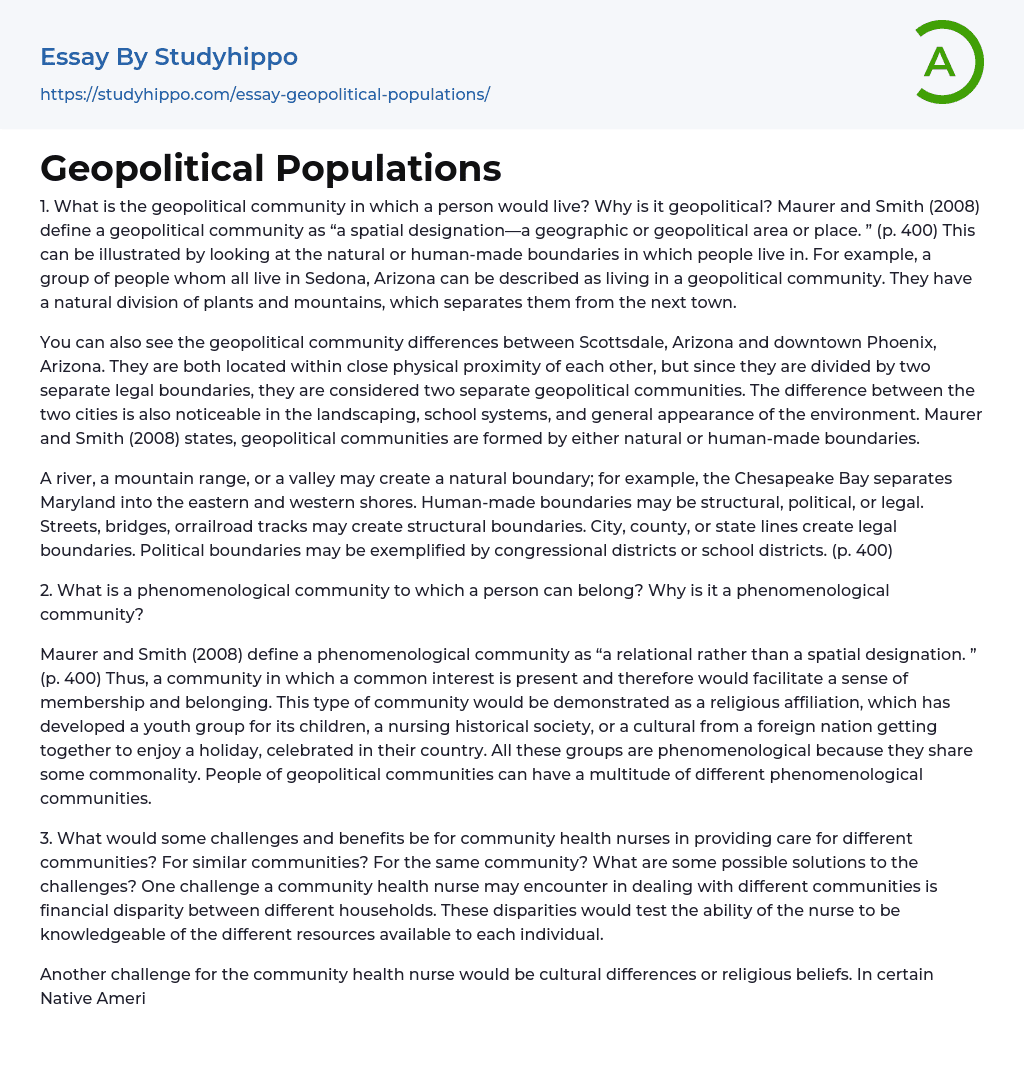1. According to Maurer and Smith (2008, p. 400), a person's geopolitical community is determined by their geographic or geopolitical location. Geopolitical communities can be identified through natural or human-made boundaries. For example, individuals living in Sedona, Arizona can be considered part of a geopolitical community because of the plants and mountains that act as natural barriers separating them from nearby towns.
You can observe the geopolitical community distinctions between Scottsdale, Arizona and downtown Phoenix, Arizona. Despite their close physical proximity, they are regarded as two separate geopolitical communities due to being divided by distinct legal boundaries. The contrast between the two cities is evident in the landscaping, school systems, and overall environment. According to Maurer and Smith (2008), geopolitical communities can be shaped by natural or man-made boundaries.
justify">
Both natural and human-made boundaries can divide areas. Natural boundaries, such as rivers, mountains, and valleys, create divisions between regions. An example of this is the Chesapeake Bay which separates Maryland into its eastern and western shores. On the other hand, human-made boundaries are established through structures, politics or laws. Structural boundaries can be seen in streets, bridges or railroad tracks while legal boundaries are formed by city, county or state lines. Political boundaries are defined by entities like congressional districts or school districts (p. 400).
Why is a phenomenological community deemed as one that a person can belong to?
According to Maurer and Smith (2008), a phenomenological community is defined as a relational rather than a spatial designation (p. 400). Therefore, it is a community where a common interest is present, fostering a sense of membership and belonging. Example
of phenomenological communities include religious groups with youth groups, nursing historical societies, or cultural groups celebrating holidays from their home countries. These groups are all phenomenological because they share some commonality. Geopolitical communities can have various phenomenological communities within them.
3. Community health nurses may face challenges and benefits in providing care for various communities as well as similar communities. Additionally, they may encounter challenges in providing care for the same community. One possible challenge is the financial disparity between households in different communities, which can impact a nurse's ability to access resources for each individual. Finding solutions to these challenges is crucial for effective care delivery.
The community health nurse may face cultural or religious difficulties when working with communities, including variations in beliefs and practices. Some Native American cultures and Catholic religions might not prioritize mental health treatments such as therapy or medication, instead seeking guidance from shamans or priests for spiritual support. It is crucial to acknowledge that not all individuals within a particular community hold the same belief system. Therefore, the community health nurse must provide recommendations cautiously to prevent causing offense or damaging the patient relationship.
During outbreaks like swine flu or the West Nile virus, the community health nurse is essential. With her knowledge of the local community, she can educate and monitor its residents. Moreover, she can effectively coordinate resources and arrange clinics for administering H1N1 vaccines. Additionally, she has a crucial role in informing the community about government initiatives that aim to prevent the spread of the West Nile virus.
This would help reduce any hysteria created by the news. The nurse can
also closely monitor statistical results. According to Maurer and Smith (2009), community nurses should focus on environment, housing, transportation, education, and political process subsystems. These elements are all connected to geographic locations, as well as population composition and distribution, health services, resources, and facilities. Data from specific geopolitical areas are often used in statistical and epidemiologic studies (p. 400).
- Hospital essays
- Physician essays
- Health Care Provider essays
- Universal Health Care essays
- Readmission essays
- Psychometrics essays
- Measure essays
- Why I Want to Be a Nurse essays
- Nursing Profession essays
- Why Did You Choose Nursing essays
- Appeal essays
- Revenge essays
- Corporate Governance essays
- Public Service essays
- Income Tax essays
- Supply essays
- Red Cross essays
- Democracy essays
- State essays
- Liberty essays
- Absolutism essays
- Reform essays
- Republic essays
- John Marshall essays
- Bourgeoisie essays
- Developed Country essays
- Elections essays
- International Relations essays
- Left-Wing Politics essays
- Monarchy essays
- Political Corruption essays
- Political Party essays
- Political Science essays
- Sovereign State essays
- United Nations essays
- World Trade Organization essays
- Contras essays
- Dictatorship essays
- Foreign policy essays
- Monarch essays
- Corruption essays
- Foreign essays
- Democratic Party essays
- European Union essays
- President Of The United States essays
- John Stuart Mill essays
- Terrorism essays
- Military essays
- Social Security essays
- Federalism essays




